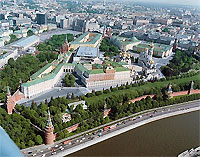Squabbles And Splits In Putin's Nomenklatura Mar His New Presidency
Pavel K. Baev - Russia Profile - russiaprofile.org - 4.9.12 - JRL 2012-66
A major advantage of the scheme for consensual rotation between Prime Minister Vladimir Putin and President Dmitri Medvedev by the means of presidential elections was supposed to be a low intensity of infighting in the common court over which they jointly rule. It has not quite happened this way not only because the courtiers are over-excited about the re-distribution of privileges, but also due to the debilitating decay in the ruling bureaucracy. The initial round of reshuffling went perfectly smoothly. Putin's old favorite, Sergei Ivanov, was promoted to the head of the presidential administration, and the too-smart-by-half intriguer, Vladislav Surkov, was demoted to an insignificant position in the government. Further elevations and falls from grace, however, have become enmeshed in the hidden but acute rivalry between the two rulers, clashes of interests between clans and ambitious newcomers, as well as nasty corruption scandals. Moreover, the system has come under unexpected pressure from the emboldened and quickly regrouping opposition.

file photo The task of moving the top-level sycophants around is complicated by the problem typical for extra-mature bureaucracies: each of them has acquired a vast clientele while there are few rich pastures available for retiring the ineffectual loyalists. Medvedev is keen to prove that he was not downgraded to just another "technical premier." Therefore, he insists on staffing the government with new faces that will answer to him (Nezavisimaya Gazeta, April 2). The test of his ability to form a manageable team has become very personal and focuses on Igor Sechin, Putin's trusted lieutenant. Sechin is holding on to his chair of deputy prime minister in charge of the energy complex, which allows him to protect the interests of several privileged companies, first of all Rosneft (Gazeta.ru, April 4; Vedomosti, March 19). What makes his intransigence more credible is the high-resonance corruption scandal targeting first deputy prime minister Igor Shuvalov, who could have been one of Medvedev's allies (Moskovskie Novosti, Moscow Echo, March 30). Another difficult issue is the replacement of Interior Minister Rashid Nurgaliev, who has clearly failed to implement meaningful police reform but remains a safe pair of hands for Putin (Expert, April 2). Defense Minister Anatoly Serdyukov is hugely unpopular in the officer corps, but his replacement would have signified a big gain for ambitious deputy prime minister Dmitri Rogozin, who is quickly building a position of power for himself (RBC Daily, April 5).
The squabbles are no less intense at the regional level where governors ponder the consequences of the new law that will make them face elections (Kommersant, April 2). The Kremlin is in a hurry to replace the governors who have shown weakness in controlling the electoral process, like for instance in the Murmansk oblast (Gazeta.ru, April 4). Perhaps the most important appointment was that of Sergei Shoygu, the longest serving and the most popular Minister for Emergency Situations, who, as the newest governor of Moscow oblast, will now have to deal with the multiple and varied sources of discontent in the capital city (Ezhednevny Zhurnal, Ap